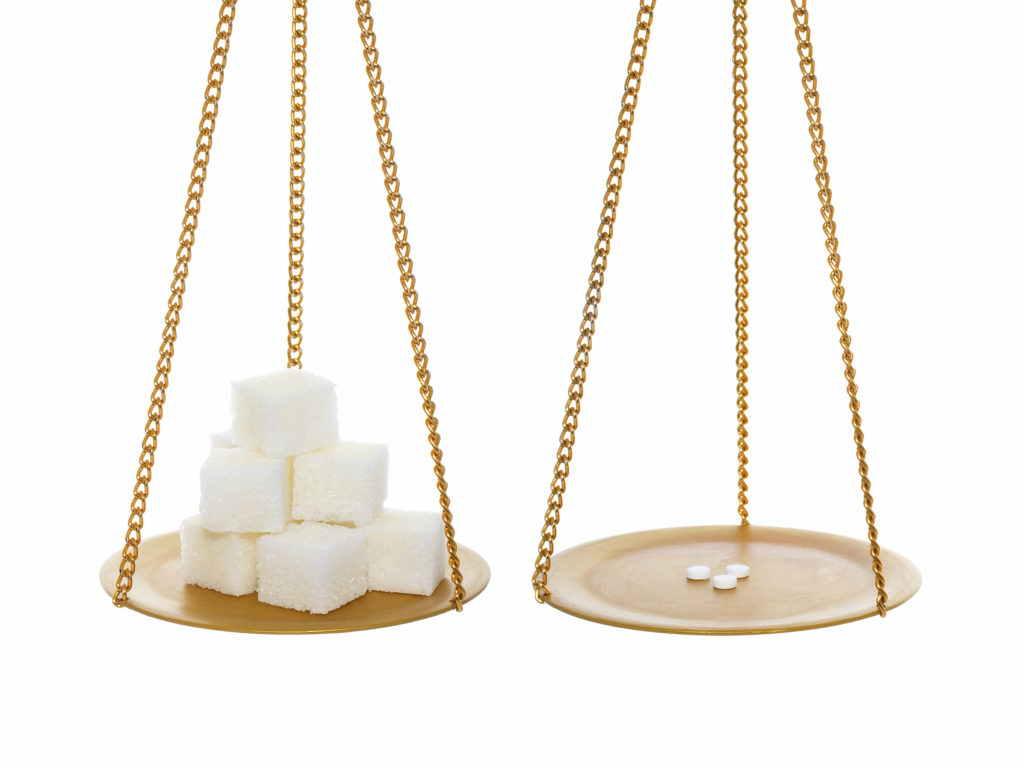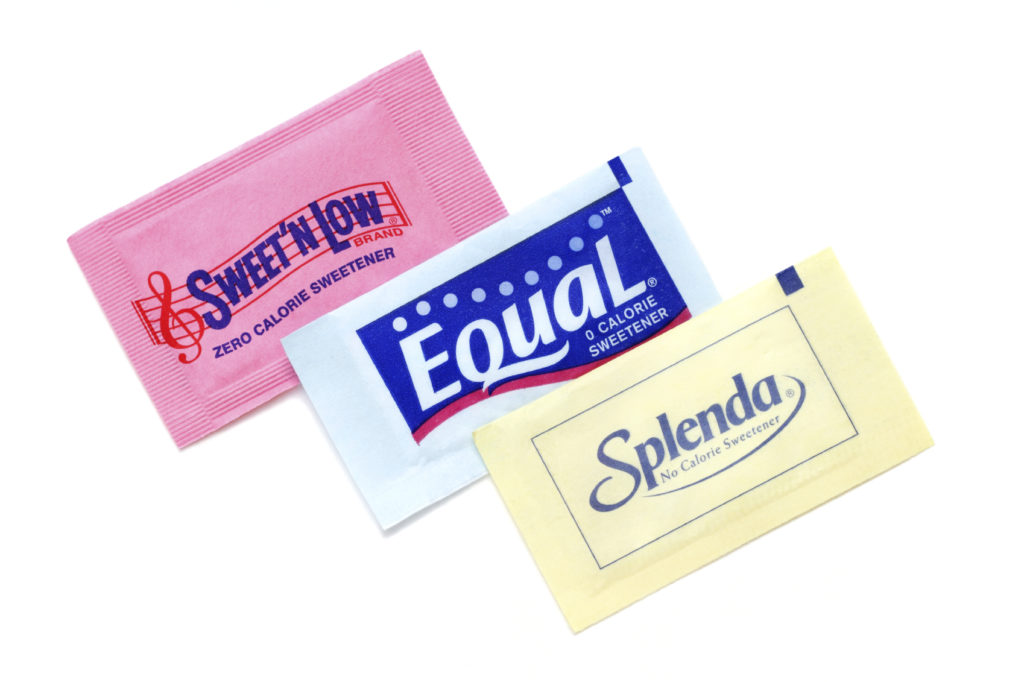Today’s post was written in response to a comment left on our post “Half and Half vs. Non-dairy Creamer- What’s the best for coffee?” We are fortunate that Emily Myers, a graduate student in the Department of Human Nutrition, Foods, and Exercise at Virginia Tech, was willing to share her insights into this controversial topic. I know there are strong opinions both ways about artificial sweeteners, so please read with an open mind and make your decision based on what is right for you. You can also find more information about the research on artificial sweeteners in this publication: Nonnutritive Sweeteners: Are They Safe?
“Artificial sweeteners cause cancer!”
“Artificial sweeteners can help you lose weight!”
“Artificial sweeteners cause weight gain!”
Artificial sweeteners are a popular topic in the nutrition rumor mill. One day, an article reports they have positive benefits and the next day someone says they have negative effects. So what are artificial sweeteners and why are they so controversial?
Artificial sweeteners are high-intensity sweeteners that are between 100 – 1,000 times sweeter than sugar. They do provide a small amount of calories, but their concentrated sweetness means less of the sweetener is needed in food and beverages to achieve the same amount of sweetness.
Artificial sweeteners are used in a variety of foods and beverages. The most common are diet sodas and sweetener packets, but they are used in much more than just those. Artificial sweeteners can be found in “lite” versions of yogurts, coffee drinks, or ice creams, sugar-free chewing gum, and many other foods and beverages! If you’re concerned about artificial sweeteners, it’s important to look closely at the ingredient list on your food.
In the United States, there are five types of artificial sweeteners that are commonly used in foods and beverages. The Acceptable Daily Intake is the amount the Food and Drug Administration (FDA) has determined to be well within safe consumption levels. As you can see, the Acceptable Daily Intake for each of these sweeteners is significantly less than what most people are likely to have in a day.
|
Sweetener |
Common name | Number of 12 fl oz diet sodas to reach Acceptable Daily Intake (for 150-pound person) | Number of packets to reach Acceptable Daily Intake (for 150-pound person) |
| Acesulfame Potassium | Sweet One, Sunette |
25 12-ounce servings |
20 packets |
| Aspartame | Equal, Nutrasweet |
14 12-ounce servings |
68 packets |
| Saccharin | Sweet’N Low |
42 12-ounce servings |
8.5 packets |
| Sucralose | Splenda |
15 12-ounce servings |
30 packets |
| Stevia | Truvia, PureVia, Sweet Leaf |
16 12-ounce servings |
30 packets |
Current research on artificial sweeteners is looking at their effect on cancer, weight loss, weight gain, changes in dietary patterns, diabetes, heart disease, and migraine headaches. The research that is available indicates that FDA-approved artificial sweeteners do not increase the risk of getting cancer. They are considered a safe alternative for people with diabetes or people trying to cut back on added-sugar.
The effect of artificial sweeteners on energy balance and weight control is still to be determined. Some studies have shown that replacing sugar-sweetened beverages with artificial sweeteners may encourage weight loss in overweight or obese adults. But other studies have shown that artificial sweetener consumption is associated with weight gain over time. More research is needed to determine how artificial sweeteners affect weight. For people struggling with their weight, the potential risks of artificial sweeteners are likely outweighed by the risks of being overweight or obese.
Ultimately, it’s a personal decision whether or not to consume artificial sweeteners. Because they are found in many more foods than just diet sodas and sweetener packets, many people don’t realize they are consuming artificial sweeteners. This is yet another reason to get in the habit of reading food labels and ingredients. Individuals should consult with their healthcare providers to determine if their added-sugar consumption is having a negative impact on their health and if artificial sweeteners may be a possible alternative. The limited research on artificial sweeteners needs to be expanded to determine their long-term effect on weight status.
Disclaimer: Commercial products are named in this publication for informational purposes only. Virginia Cooperative Extension does not endorse these products and does not intend discrimination against other products which also may be suitable.
References:
“Artificial Sweeteners and Cancer” Accessed 22 Sept. 2015 <https://www.cancer.gov/about-cancer/causes-prevention/risk/diet/artificial-sweeteners-fact-sheet>
Gardner, C., Wylie-Rosett, J., Gidding, S., Steffen, L., Johnson, R., Reader, D., . . . on behalf of the American Heart Association Nutrition Committee of the Council on Nutrition, Physical Activity and Metabolism, Council on Arteriosclerosis, Thrombosis and Vascular Biology, Council on Cardiovascular Disease in the Young,and the American D. (2012). Nonnutritive sweeteners: Current use and health perspectives. A scientific statement from the American heart association and the American diabetes association. Diabetes Care, 35(8), 1798-1808. doi:10.2337/dc12-9002
“Low Calorie Sweeteners” Accessed 22 Sept. 2015 <https://www.diabetes.org/food-and-fitness/food/what-can-i-eat/understanding-carbohydrates/artificial-sweeteners/?referrer=https://www.google.com/>
“Non-Nutritive Sweeteners (Artificial Sweeteners) – American …” 2014. Accessed 22 Sept. 2015 <https://www.heart.org/HEARTORG/GettingHealthy/NutritionCenter/HealthyEating/Non-Nutritive-Sweeteners-Artificial-Sweeteners_UCM_305880_Article.jsp>
Passaro EM, Zoellner JM, Davy BM, Hedrick VE. Characterization of Artificial Sweetener Consumption Patterns in a Sample of Rural Southwest Virginian Adults. Presented at the Annual Meeting of the Food and Nutrition Conference and Exposition (FNCE), Academy of Nutrition and Dietetics, Nashville, TN, October 5, 2015
Tate, D., Turner-McGrievy, G., Lyons, E., Stevens, J., Erickson, K., Polzien, K., . . . Popkin, B. (2012). Replacing caloric beverages with water or diet beverages for weight loss in adults: Main results of the choose healthy options consciously everyday (CHOICE) randomized clinical trial. AMERICAN JOURNAL OF CLINICAL NUTRITION, 95(3), 555-563. doi:10.3945/ajcn.111.026278


